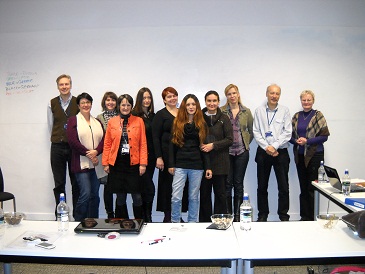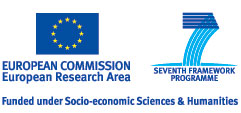Museum citizens: audience identities and experiences
This research strand takes contextual knowledge from Eunamus other areas of studies and relates it to visitor experiences. The aim is to explore the understanding and use of national museums by the public. The politics of nation-building through museums involves people in two ways: museums are sites of construction of identity and citizenship since they provide representations of the historical past, identity frames in which people to relate themselves; on the other hand, within museums people are active knowledge-producers of nation and citizenship and not only consumers of the museum’s messages.
The politics of nation-building through museums involves people in two ways: museums are sites of construction of identity and citizenship since they provide representations of the historical past, identity frames in which people to relate themselves; on the other hand, within museums people are active knowledge-producers of nation and citizenship and not only consumers of the museum’s messages.
It also aims to map public understanding of the nation and Europe in the present and how visitors use the past to construct national and European identities. Different methodologies will be utilised to record and understand various aspects of visitors’ experience of trans-national and citizen relevant dimensions of their visits, aiming to develop an understanding as to how the dialogue between European citizens can be strengthened and how a shared view of European citizenship can emerge. Using both both qualitative and quantitative methods, data has been collected in nine European museums: the National Museum of Scotland, the National Museum of Ireland, the National Museum of Estonia, the National Historical Museum in Greece, the Open-Air National Museum of Latvia, the Nordiska Museet in Sweden, the Deutsches Historisches Museum in Germany, the Museum of Catalan History in Spain and the Rikjsmuseet in the Netherlands.
Developing methodology
The last week of February 2011, the research team for the research strand gathered at the University of Tartu in Estonia for an intensive workshop. The aim was to discuss the findings from the pilot studies that took place at the National Museum of Scotland in Edinburgh and the Byzantine and Christian Museum in Athens. Furthermore, to exchange ideas and views, to finalise methodology issues and finally to decide on the case studies.
Furthering findings
 On November 10th-11th 2011, a second workshop took place in the School of Museum Studies at the University of Leicester. The workshop was organized by the Research Centre for Museum and Galleries, which has been working on this work package. In the intensive but very productive two days, the researchers from the three universities participating in this research strand, i.e. the University of the Aegean, the RCMG of the University of Leicester and the University of Tartu, discussed the qualitative data collected during the previous period in six museums across Europe: the National Museum of Scotland, the National Museum of Ireland, the National Museum of Estonia, the Open-Air Museum of Latvia, the National Historical Museum of Athens and the Deutches Historisches Museum in Berlin.
On November 10th-11th 2011, a second workshop took place in the School of Museum Studies at the University of Leicester. The workshop was organized by the Research Centre for Museum and Galleries, which has been working on this work package. In the intensive but very productive two days, the researchers from the three universities participating in this research strand, i.e. the University of the Aegean, the RCMG of the University of Leicester and the University of Tartu, discussed the qualitative data collected during the previous period in six museums across Europe: the National Museum of Scotland, the National Museum of Ireland, the National Museum of Estonia, the Open-Air Museum of Latvia, the National Historical Museum of Athens and the Deutches Historisches Museum in Berlin.
After a brief presentation of the Museums and the context of the data collection, the workshop was structured around the themes that have been identified as important during the previous stages of the planning of the research, but also during the collection and first analysis of the data: How people use museums for the construction of their identity; How people use museum objects and narratives; What the visitors think is missing from national museums; Ideas of Europe; Minority groups’ views and so on, were among the key questions.
The analysis of the data collected through interviews and focus groups will be completed in 2012, by the RCMG, while the data collected through questionnaires will be analysed by the team of the University of the Aegean.
Making findings public
Findings will be discussed at public lectures and a research workshop in Athens 26-27 April. Click here to read more. A written report is due June 2012.
The research strand is directed by Alexandra Bounia, Assistant Professor of Museology at the University of the Aegean, Greece, Department of Cultural Technology and Communication. Click here to read more.


